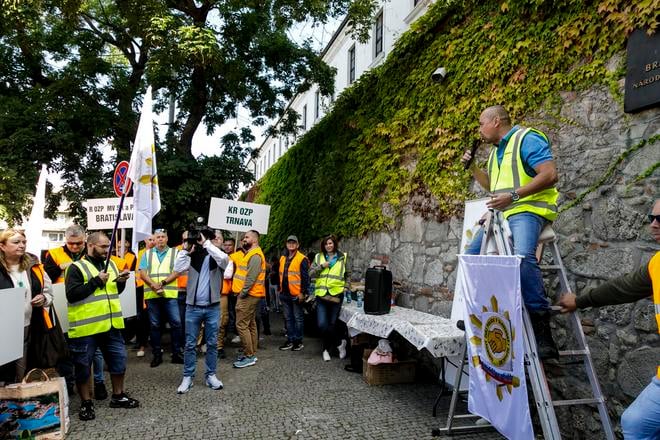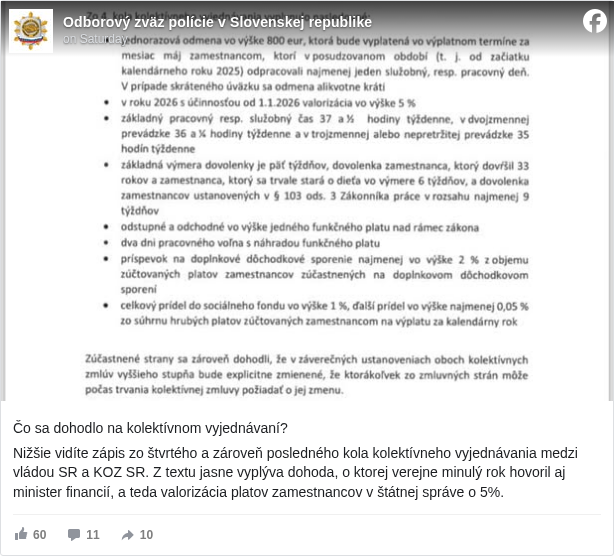Hundreds of Slovak police officers and firefighters protested outside parliament in Bratislava on Wednesday, 17 September, demanding higher wages and improved working conditions after the government announced it would not deliver a previously agreed pay rise.
It was the largest demonstration by police in almost 20 years, with some officers travelling from as far as eastern Slovakia, according to Denník N. They were joined by dozens of firefighters, who said they were facing similar problems of low pay, long hours and outdated equipment.
“We expected reforms and instead our real incomes are falling,” said Štefan Birmon, a police union representative from Topoľčany.
The immediate cause of the protest was Finance Minister Ladislav Kamenický of Smer’s statement that the government would not implement a 5 percent pay rise planned for 2026. Officers had already accepted a freeze this year. Police and firefighter unions, including those usually supportive of the government, said the reversal amounted to a breach of trust.
Protesting officers also fear their real incomes will fall next year compared with 2023. Although they have been promised a one-off €800 payment this year, they say it will not offset planned cuts to tax bonuses and personal allowances, the Slovak daily writes.
Union representatives also highlighted long-term issues such as deteriorating stations, missing equipment and a lack of staff after hundreds of experienced officers and firefighters retired last year. The shortages have forced units in the Bratislava Region to operate with only two working ladder trucks capable of reaching above the third floor.

To cope with low wages, many officers and firefighters take on second jobs. Firefighters interviewed outside parliament said they were working in haulage, gyms or construction, while police officers reported working illegally as bouncers or drivers. “I work 240 hours a month for €1,150 net. In Bratislava, it’s not possible to survive on that,” said one firefighter, who paints houses on the side.
Interior Minister Matúš Šutaj Eštok of Hlas said he was surprised by the scale of the protest and argued that no binding agreement on salaries had been signed. He called for further dialogue with unions.
Union leaders rejected that explanation and said their members had been misled. The Confederation of Trade Unions (KOZ) and the Police Trade Union (OZP) published minutes of recent talks with the government in which a 5 percent rise had been recorded.
“We feel cheated,” said Birmon.
Defence Minister and former interior minister Robert Kaliňák of Smer said opposition parties were to blame for budget shortfalls, and suggested dissatisfied officers and firefighters could earn more money by joining the military reserves.
Low pay and poor working conditions in Slovakia’s emergency and security services have been a long-standing problem that no government has managed to resolve to the satisfaction of police officers or firefighters. The party that has held power the longest, however, is Smer, led by the current prime minister, Robert Fico.
The recent demonstration reflected wider problems in the services, where morale is low and staff turnover is high. Some new recruits leave after only a few months despite completing lengthy training. “A colleague joined in March and quit in July. Without another job, he could not continue,” said a firefighter from Bratislava.
Police and firefighter unions issued a joint statement warning that without urgent action, the country’s emergency services could be further weakened. “Security forces are already in a critical situation,” they said.


 Peter Jakubík (centre), head of the Police Trade Union (OZP), speaks during a rally outside the parliament building in Bratislava on Wednesday, 17 September 2025. The union organised the protest in opposition to the government’s decision to freeze planned pay rises in 2026, part of its public finance consolidation measures. Firefighters and representatives of the Prison and Court Guard Service also joined the demonstration. (source: TASR)
Peter Jakubík (centre), head of the Police Trade Union (OZP), speaks during a rally outside the parliament building in Bratislava on Wednesday, 17 September 2025. The union organised the protest in opposition to the government’s decision to freeze planned pay rises in 2026, part of its public finance consolidation measures. Firefighters and representatives of the Prison and Court Guard Service also joined the demonstration. (source: TASR)



